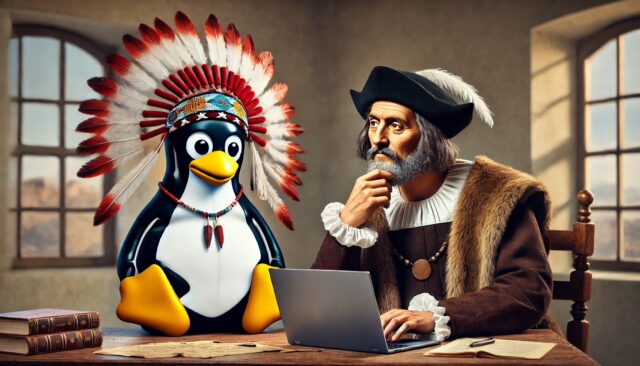Switching from Microsoft Windows 11 to Linux is like Columbus discovering America

Switching to Linux is like Christopher Columbus discovering America -- but in ways both good and bad. Just as Columbus set sail for uncharted waters in search of something new, users moving from Windows or macOS to Linux are venturing into unfamiliar territory, leaving behind a world they’ve known for something potentially better. However, much like the story of Columbus, this transition can come with its complexities -- and some parallels are worth exploring, including the relationship between Columbus and the Native Americans.
At first glance, making the switch to Linux might seem like entering a brand new land. The user interfaces, package managers, and the open-source philosophy can feel as different as the Americas were to Columbus. For someone who has spent years navigating Windows or macOS, things like the Linux terminal or alternative software solutions might feel like a foreign language. Instead of the Start menu, you’re greeted with new desktop environments like GNOME, KDE, or Xfce. It can feel daunting, much like Columbus’s sailors must have felt when they lost sight of the European coast.
But once you begin to dig into Linux, you realize it is a land rich with resources and potential, just as the Americas were to European explorers. Linux offers unparalleled customization, security, and efficiency, allowing users to tailor their system to their exact needs. In this sense, it’s like discovering a bountiful new world where you can make the rules, as you’re no longer bound by the constraints of proprietary operating systems.
However, just as Columbus didn’t truly “discover” America -- it was already inhabited by Native Americans with their own complex societies and technologies -- switching to Linux isn’t a journey to an unpopulated wilderness. Linux has been around for decades, built and nurtured by a dedicated and vibrant community of developers, power users, and hobbyists. They’ve created a rich ecosystem that thrives on collaboration, openness, and sharing knowledge.
In this analogy, the Linux community might represent the Native Americans -- they were here long before you arrived, and they’ve cultivated this environment into something functional and sustainable. New users, much like Columbus, can’t expect to simply impose their old habits and ways of thinking on this system without recognizing that Linux operates differently from the world they left behind.
Unlike the darker aspects of European colonization -- where Native American cultures were often disregarded or destroyed -- the transition to Linux requires respect for the community and its ethos. Linux isn’t about forcing the old ways of Windows or macOS into a new environment; it’s about adapting and embracing new ideas. You can’t bring along all your proprietary software without finding alternatives that fit the Linux ecosystem. Some tools and workflows might be different, but that’s part of the adventure.
Of course, there are challenges along the way. Just as Columbus faced storms and uncertainty, Linux newcomers might encounter some turbulence. Hardware compatibility issues, unfamiliar software, or figuring out how to compile programs can feel like running into unexpected obstacles. But this is where the Linux community comes in. Rather than an untamed wilderness, it’s a space filled with knowledge and cooperation -- forums, wikis, and open-source contributors ready to help you find your way.
And much like Columbus’s impact on the world, switching to Linux has the potential to fundamentally change your relationship with technology. The discovery isn’t just in finding a different operating system; it’s realizing that you can be free from corporate control, surveillance, and forced updates. Linux hands the power back to you, the user. Once you’ve navigated these new waters, many find it hard to return to their old ways, much like Columbus could never go back to thinking the world was flat after seeing the New World for himself.
In the end, switching to Linux isn’t about conquest or domination -- it’s about coexistence, learning, and growing in an environment where freedom and openness rule. You might start off feeling like an explorer, but soon you’ll discover that this world isn’t new at all. It’s been waiting for you to arrive.
